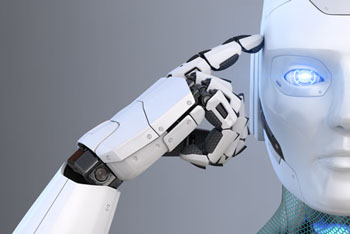Artificial intelligence (AI) is an umbrella term for a large set of ideas revolving around reasoning by non-living objects, such as computers. It is generally divided into two types.

Strong AI is still some way off, but weak AI is already here.
Strong artificial intelligence (sometimes also called true artificial intelligence) is the ability of a machine to exhibit general intelligence, where a machine can learn any task and react to almost any situation, indistinguishably from a human. The standard test for this is the Turing test devised in 1950 by Alan Turing where a computer passes the Turing test if a human being who converses with it cannot tell it from a human.
Click here to see the entire artificial intelligence FAQ
In contrast, weak artificial intelligence is the ability of a system to be trained to do a specific (albeit complex) task. While the concept of strong AI can currently only be found in science fiction, we are surrounded by examples of weak AI in our lives every day. One example is speech recognition – it is now routine for computers, mobile phone features such as Siri and even car insurance telephone systems to use mathematical algorithms to recognise and understand fairly complex speech, and even answer simple questions. We’re also becoming familiar with things like ChatGPT and generative AI producing amazing results that would often pass the Turing test, but only on specific tasks.
You can find out more about artificial intelligence in Chris Budd’s article, What is a robot?
About this article
This article was written by Kweku Abraham, Chris Budd, Marianne Freiberger, Yury Korolev and Rachel Thomas.
Kweku Abraham is a postdoctoral researcher in statistics at the University of Cambridge, working on the mathematics of deep learning.
Chris Budd is based at the University of Bath, where he is Professor of Applied Mathematics. He is also Professor of Maths at the Royal Institution and Gresham Professor of Geometry. He has also been the Education Officer of the London Mathematical Society, and Vice-President of the Institute of Mathematics and its Applications.
Yury Korolev is a Lecturer in Mathematics and Data Science and an EPSRC Postdoctoral Fellow at the Department of Mathematical Sciences at the University of Bath, and a Quondam Fellow of Hughes Hall, University of Cambridge.
Marianne Freiberger and Rachel Thomas are Editors of Plus.
This article was produced as part of our collaboration with the Mathematics for Deep Learning (Maths4DL) research programme. Maths4DL brings together researchers from the universities of Bath and Cambridge, and University College London and aims to combine theory, modelling, data and computation to unlock the next generation of deep learning. You can see more content produced with Maths4DL here.
